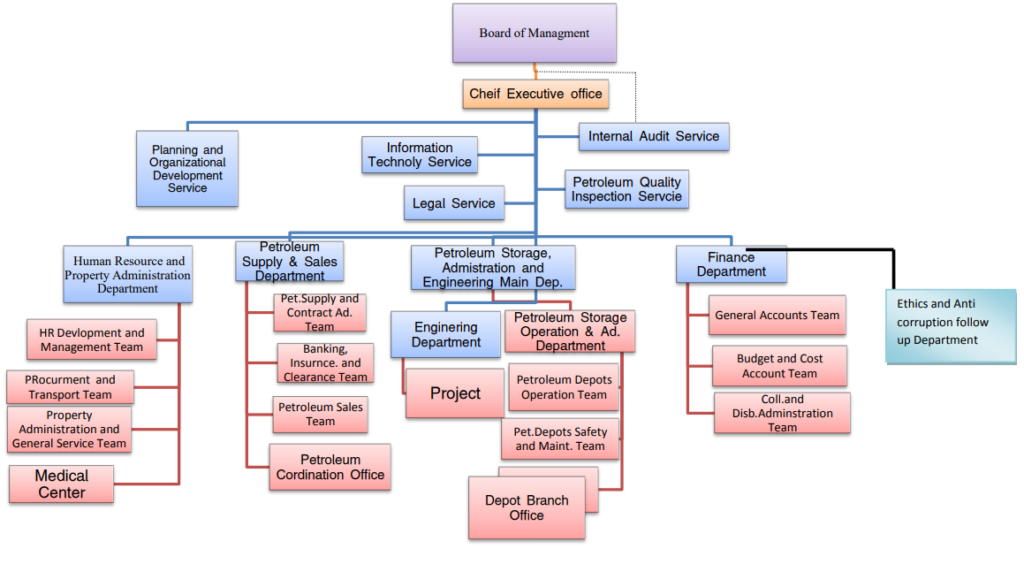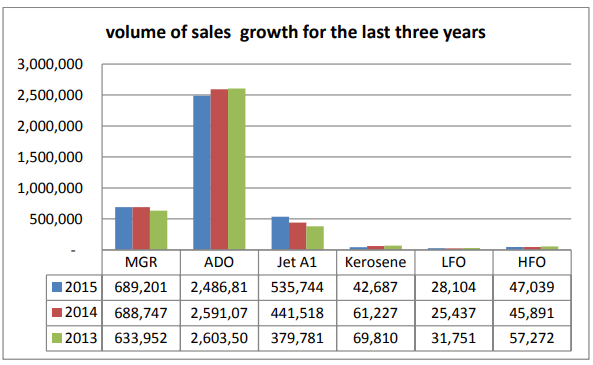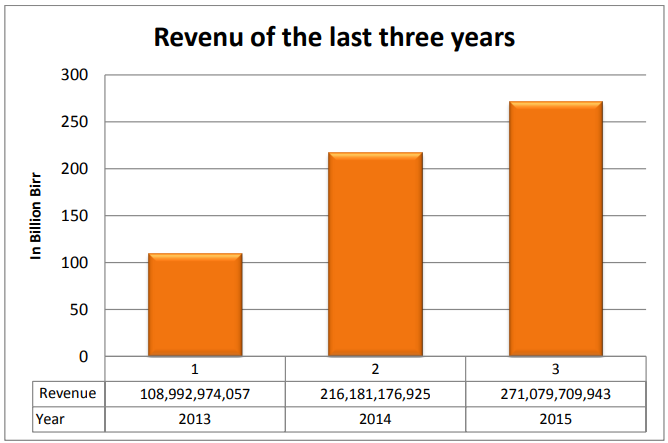Background
The Ethiopian Petroleum Supply Enterprise (EPSE) has a long history dating back to the end of Menelik II’s regime. In 1905, when the Addis Ababa-Djibouti railway constructed, petroleum suppliers such as Agip, Shell, and Caltex supplied fuel to the small number of vehicles using the locomotive to import fuel via the port of Djibouti. This period marked as the beginning of fuel supply in Ethiopia. After that since on 1942, Addis Ababa city had
organized into a municipal council, the vehicles started entering the country.
In January 1964, the construction of the refinery began with five hundred professionals from the then Soviet Union, and more than 3,000 professionals and daily laborers from Ethiopia. The construction of the refinery was completed in October 1967. The government then organized a governmental institution known as the Ethiopian Petroleum Refinery Share Association in 1967 Importing fuel in a modern and organized way became a key question. To achieve the country’s fuel supply demand, the government planned to build Petroleum refinery at Assab in 1962.
The refinery capacity was 500,000 metric tons of crude oil yearly. However, the refinery’s capacity was increased to 650,000 metric tons annually in 1971 to achieve the increasing fuel demand of the country. In May 1991, the Eritrean Liberation Front took control of the refinery’s operation. But, the Ethiopian and Eritrean governments agreed to utilize the refinery jointly, and the refinery’s courtesy continued for both countries until 1995.
In 1995, the Refinery Share Association was reorganized as a governmental development entity named Ethiopian Petroleum Enterprise and its capital increased to 300 million Birr in 1997. The Assab Refinery has been main source of refined petroleum products in Ethiopia. However, due to skyrocketing maintenance costs, reduced capacity, and increasing fuel demand, the refinery coverage was only 30% of the country’s petroleum demand. Thus, the enterprise was obliged to import different petroleum products, such as gasoline, gasoil/diesel, kerosene/jet-A, and light and heavy fuel oil, in order to cover the petroleum demand of the country cost-effectively.
The Current Ethiopian Petroleum Supply Enterprise (EPSE) was established by a merger of Ethiopian Petroleum Enterprise (EPE) and the National Petroleum Reserve Depot Administration (NPRDA) by the regulation of council of ministers in 2012. EPSE has
responsibility vested in its establishment incorporating petroleum products purchase and distribution to the oil marketers along with administering national petroleum reserves. Petroleum purchase is conducted in two modalities; Government-to-Government negotiations basically from oil producing nations, and the second option are through an open international bid. The enterprise is also engaged in importing coal for the cement factories, ceramic, and metal industries through an open-bid purchasing system, as per the government’s direction.
EPSE administers 13 national reserve depots in different regions of the country to maintain emergency fuel disruption caused by natural or artificial calamities. Furthermore, EPSE has a branch office at Djibouti port that facilitates petroleum supply.
1.1. Regulation (authorized and paid-up capital)
The authorized capital of the Enterprise is Birr 2,000,000,000(two billion Birr) of which Birr 500,000,000(five hundred million Birr) is paid up in cash and in kind.
1.2. Mandate (Vision, mission, objectives)
1.2.1.Our Vision 2026
To be a reputable company in East Africa by supplying petroleum products to the local market and neighboring countries with competitive price as well as quality.
1.2.2.Our Mission
Ensure sustainable supply and maintain strategic national petroleum products reserve that meets the country’s demand.
1.2.3.Our Objectives
The objectives for which the Enterprise is established are:
- On the basis of assessment of the country’s demand, to supply petroleum to distribution Companies by importing clean products and by importing and processing crude oil;
- To forecast, maintain and administer the required national petroleum reserve and, based on instructions of the government, supply petroleum products from the reserve;
- To build its own petroleum depots within the country and, as may be necessary, in neighboring countries; and to invest in companies operating petroleum depot facilities;
- To engage in any other related activities necessary for the attainment of its objectives.
1.2.4. Values
- Team Spirit
- Responsiveness
- Effectiveness and efficiency
- Stimulating innovation
- Ethical behavior
- Safety
- Environmental and Social responsibility
- Diversity and Participation
1.3. Reform
EPSE has implemented various reform schemes to enhance its performance and achieve costumers as well as stakeholders satisfaction. To mention few,
- Business Process Reengineering (BPR),
- Balanced Scorecard (BSC),
- Kizen,
- Enterprise Resource Planning (ERP) had been implemented step by step since 2007.
- IFRS implemented in 2019
- Fuel Supply System implementing all over the country – 2023
Organizational Reforms
Year | Capital | Refinery’s / Reserve capacity | Employees | |
1967 | Ethiopian Petroleum Refinery Share Association | 48,000,000 Birr. | 500,000 metric tons | When the refinery began work there were 578 Ethiopian and 154 Russian Staff |
1971 | Ethiopian Petroleum Refinery Share Association | 66,932,305 | 650,000 metric tons | 578 |
1995 | Ethiopian Petroleum Enterprise | 100 million Birr | 800,000 metric tons. | 578 |
1997 | EPE | 300 million Birr. | – | 569 |
2004 till now | Ethiopian Petroleum Supply Enterprise | 2,000,000,000 (two billion Birr) of which Birr 500,000,000(five hundred million Birr) is paid up in cash and in kind. | 425,200 m3 | 558 |
2. Business model
2.1.Business Units
Currently the enterprise is led by a CEO, D/CEO, Six departments, five services, thirteen depot branch offices and one foreign branch office at Djibouti. Business units are as follows.
- Petroleum Supply and Sales Department
- Petroleum Storage Administration and Operation
- Petroleum Quality Assurance Service
- Planning & Organizational Development Services
2.2.Products /Services/brand, what product/services EPSE Provide
2.2.1.EPSE Provide the following Products and service
i. Gasoline (MGR)
ii. Automotive Diesel oil ADO
iii. Jet A1
iv. Kerosene
v. Light Fuel Oil (LFO)
vi. Heavy Fuel Oil (HFO)
2.3.Stockholders
- Ethiopian Investment Holdings
- EPSE Board of Management
- National Bank of Ethiopian
- Minster of Fiancé
- Minister of Transport and Logistics
- Ethiopian Shipping & logistics Service Enterprise
- Ethiopian Insurance Corporation
- Commercial Bank of Ethiopia
- Private Commercial Banks 3+
- Minister of Trade and Regional Integration
- Petroleum and Energy Authority
- Ethiopia Customs Commission
- Minster of Revenue
- Supplier
- Horizon terminal
- Independent Inspectors at loading and unloading ports
- Ethio Telecom
- Federal Police
2.4.Potential Suppliers and Partners
2.4.1. Suppliers
- Vitol
- Kuwait Petroleum Corporation (KPC).
- Be Energy S.A
- INTERNATIONAL MINING & TRADING AG
- Trafigura Pte
- PetroChina
- ADNOC
2.4.2. Customers
- Oil Marketing Companies (50+)
- Independent Petroleum Group (IPG) Djibouti
- Ethiopian Air Lines
- Cement Factories
- Fuel Transporters
- Retail Stations
- Universities
- Federal Police
- Defense Minister
- End Users
2.5. Organizational Structure of EPSE

3. Operational Figures


4. Investment Opportunities
The demand for fuel is growing in parallel with the economy and, as a result, oil infrastructure including terminals, storage facilities, pipelines and other related logistics arec necessity. Ethiopian Petroleum Supply Enterprise is looking forward to work with the
industry players in joint venture and partnership modalities.
The Major Investment of EPSE for the last 3 years was construction of Awash Operational Depot by own force and finance.
5. Key Success and economic role in the country
Ethiopian Petroleum Supply Enterprise is a nationally registered public enterprise with a major mission of supplying refined petroleum products to the country and administers national reserve depots. It plays major role in availing five brands of petroleum products for the public and developmental sectors catering the economy. It is highly strategic enterprise
Tax and Dividend Contribution/ and CSR
2015 | 2014 | 2013 | |
Dividend Contribution | 625,367,798 | 382,783,917 | 616,444,894 |
Tax | 271,720,493 | 125,810,539 | 297,201,357 |
5.1.Corporate Social Responsibility
- EPSE has concern about the protection of the environment, as Fossil fuel is a major commodity in polluting the environment. So its involvement in extensive tree planting initiatives and subsequent caretaking activities like watering and cultivation to reduce
carbon footprint is significant. . - In addition, EPSE has close relationship with various communities across Ethiopia, helping to raise the quality of life and provide individuals with life changing services and facilities.
- EPSE provides support for those living close to strategic depots, availing clean water by sinking boreholes and dealing with other issues following the requests of the communities so as to build sense of ownership.
5.2.EPSE generated 477,508,801.51 USD during the last two years.
Year | Gasoline | Steam Cool | Total |
2021 / 22 | 18,765,247.74 | 1,408,549.69 | 20,173,797.43 |
2022 / 23 | 453,925,853.30 | 3,409,150.78 | 457,335,004.08 |
Total | 472,691,101.04 | 4,817,700.47 | 477,508,801.51 |
